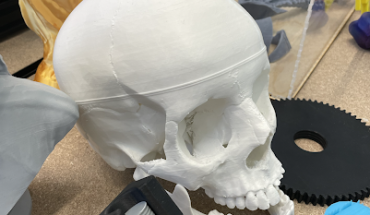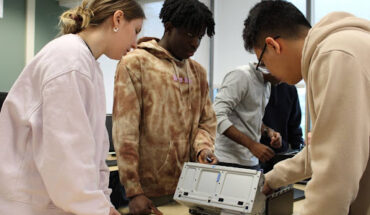(Photo credit: Sarah Kladler/Fourth Estate)
This story was originally published in the Feb. 1 issue of Fourth Estate.
A recent post audit shows that Mason will save approximately $1 million in the first five years of using it’s recently adopted cloud-based card technology.
Mason is in its third year using Atrium’s cloud-based card system, according to Mark Kraner, executive director of retail operations for Mason. The system manages the Mason card system, which includes meal plans, Mason Money, photo IDs and other applications run out of the Mason Card Office.
Mason switched card systems a few years ago after its contract with Blackboard ended, Kraner explained.
“Our contract was up, and so we went out on what we call a request for proposals from companies to provide services. … [T]wo companies bid, and Atrium had the leading bid to provide the services for the University,” Kraner said in an email.
According to Kraner, during this process, one of Mason’s priorities was adopting a cloud-based system for pragmatic and financial reasons.
“We could have a [secondary] recovery program put in place which is one of the nice parts about being on the cloud. … It’s backed up not only at the primary location, but we have two locations behind it,” Kraner said.
Kraner said that currently Mason’s data is stored in servers in North Carolina. If these were to fail, data would be saved in back-up servers in Oklahoma and Washington.
“We can move over to those locations without you, the customer, knowing we had to switch where the data is located,” Kraner said.
However, Daniel Anthes, senior manager of information technology at Mason, said a cloud-based system does not eliminate the need for servers, but rather moves them off campus.
“There are still physical servers, but George Mason doesn’t host them, our vendor hosts them for us. They host a whole bunch of them, not just our school but a whole bunch of other schools as well. They’re sort of in charge of maintaining our servers and monitoring them and making sure they’re working well,” Anthes said in an email.
One of the biggest advantages of the new system is an increase in uptime.
Using a cloud-based card system “took away the dependency on the data center,” Anthes said. “We really reduced our downtime. We were averaging probably 72 hours of down time a year, and now we average about 2 or 3 hours of downtime.”
According to Anthes, on the previous system, regular updates, general maintenance and outages were all capable of taking the system offline — an occurrence referred to as downtime. For example, during downtime campus cards and credit cards are unable to be processed. This causes an inconvenience for the customer, while also hurting business for the university.
“Those were sales that the university lost, because we couldn’t take credit cards,” Anthes said.
According to Kraner, this cloud-based card system is also more cost efficient.
“We save on average $200,000 a year over what the contract was,” Kraner said. The university no longer needs to pay for a server farm on campus, nor does it need to pay for multiple servers to back up the programs in the case of disaster recovery, according to Kraner.
According to the Atrium Migration Savings document, the five year cost for using the previous Blackboard system was $2.09 million, while the five year cost for using Atrium’s cloud-based card system is expected to be $1.1 million.
In addition, the document also showed that Mason saves $105,000 a year on server and administrative costs; $50,000 a year by not having to purchase propriety hardware; and $60,000 a year due to an increase in uptime, meaning that Mason would increase its sales by $60,000 just by being online. Additionally, the new system saves $30,000 on registers and $22,000 on copy card readers.
“The post audit showed that we did save the funds that we thought we would,” Kraner said.
The new cloud-based card system allows data to be moved over to a different server, for updates or general maintenance while the system is still live.
“If one of the vendors has to take the system down because there’s a bad disc or they need to perform routine upgrades, they can take it down, do the upgrades and send the data over to another system without any real loss,” Anthes said.
From the customer’s point of view, this transfer of data is unnoticeable as it may only result in a half second outage, according to Anthes.
Kraner added that the new cloud-based system also offers more redundancy, which essentially means having backup.
“Before the move to Atrium we were using a backup server at Science & Tech campus. This is part of our Disaster Recovery program. If the server at Fairfax was not functioning we would have a back up system that would allow us to go back to the night before, backup [the] file, and start from there,” Kraner said.
With the new cloud-based system, information is backed up in real time at multiple locations across the country. This ensures that there is no loss of data and, in the case of downtime, that the system is able to get back online faster.
From Anthes perspective, one of the most beneficial things about this change is the system’s capability to support new technologies, like the multiple credential cards that Mason released this summer.
“The move to Atrium and the cloud allowed us to leverage new technologies quicker,” Anthese said, “including this new card platform we’re on now.”




